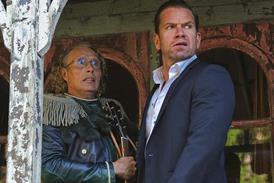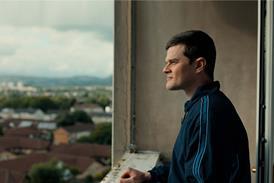Dir: Nick Cassavetes. US 2002. 116mins.
Socially relevant messages, simplistic action elements and teary melodramatic threads are manipulatively and unsuccessfully mixed in Nick Cassavetes' John Q, a film that tries to provide a "hard" look at an honest, working-class man, who loses control in his valiant effort to save his child's life. Severely flawed as the film is, it contains a solid performance from Denzel Washington, who continues the path begun in Training Day (in which he embodied a corrupt cop), here playing another flawed hero. The charisma of Washington, who's always appealed to a multi-racial audience and has enjoyed a good track record at the box-office, should help New Line secure mid-range numbers for a feature that, while lacking much realism and is borderline exploitational, still touches on the timely issue of national health insurance for millions of Americans. However, since this is less of a problem in other countries, New Line will face a marketing challenge in positioning John Q as an effective star vehicle or action film. The film's visibility will be enhanced due to Washington's Best Actor Oscar nomination (for Training Day), three days before the film's US opening.
An ordinary man who works at a factory, John Q Archibald (Washington) is devoted to wife Denise (Elise), who is also a working woman, and young son, Michael (Smith). To make ends meet, he's desperately looking for another job, after his work as a machinist is reduced to part-time and his car is repossessed. Even so, despite enormous problems, the family occupies the centre of John's life and is his source of his joy, with orderly breakfasts and dinners, support of his son's hobbies and so on.
John's world falls apart when his son collapses during a baseball game and is rushed to the hospital. In the worst possible way, he finds out that his son is in dire need of heart transplant, with expensive surgery required immediately executed if he is to survive. In the first, more realistic reel, writer James Kearns presents a rather credible profile of a blue-collar man in tough financial straits, realising that he doesn't have the insurance he thought he had to cover an operation of such magnitude; according to the film, a heart transplant costs in the neighbourhood of $250,000.
Audiences will have no problem sympathising with the hardships and obstacles faced by a forthright man, fighting against the red tape of various bureaucracies: first the insurance company, then the hospital itself, represented by its cold, matter-of-fact director (a miscast Heche).
Having exhausted all possibilities to pay for his son's operation, John appeals to Dr Raymond Turner (Woods), head of the hospital's cardiac unit, a fundamentally kind man (at one point, he offers to waive his fee), who is himself caught up and hampered by the system. With time and options running out, a desperate gamble becomes John's only hope, and he takes Turner and the entire emergency room hostage. What follows is very much a reworking of Sidney Lumet's masterpiece, Dog Day Afternoon, which tells the hard-to-believe but true-story of a loser (Al Pacino), who holds up a Brooklyn bank in order to raise money for his lover's sex-change operation. Like Pacino's hero, John barricades himself within the hospital with an unwitting group of ER hostages, all in need of medical care themselves.
Soon, a "simple" heist snowballs and becomes a citywide scandal. Thrown into the urban mess are a veteran police hostage negotiator (Duvall), who's in conflict with a quick-tempered police chief (Liotta), who wants to bring a swift end to the stand-off in what's a crucial time - an election year.
At the end, left with no other choice, John faces the ultimate parental dilemma: sacrifice his own life for the sake of his son's. Superficial and gimmicky, at this point the story sinks to the level of a schmaltzy TV Movie of the Week. In a long, farewell episode, in which John relates to his son his philosophy of life (his Ten Commandments), such as always listen to your mom and be nice to girls and treat them like princesses.
Like Joel Schumacher's urban paranoia tale, Falling Down, John Q, details the anger and desperation built within a man as a result of social and economic factors that are beyond his control. And in its good moments, which are few, John Q, does provide a look at how far an average man would push the envelope, at how ordinary people are pushed to the brink of suicide.
In goal, structure - and problems too - John Q also resembles another New Line socially-conscious action film, Set It Off. However, while the latter had four engaging women at its centre, John Q. is basically a one-character film, with all the secondary characters vastly underwritten or treated in a offhanded way that only accentuates the film's superficial platitudes. Unfortunately, the story becomes so hyperbolic that the opportunity to make viewers contemplate and take a moral stance about the price they're willing to pay for the lives of their loved ones is totally missed.
John Q suggests that when a child is sick, parents have tunnel vision and that nothing else matters. But like Falling Down, this incoherent feature cannot decide whether John is an ordinary man who becomes an (unlikely) hero or a deranged criminal (in the eyes of the law), hence concluding in an unconvincing manner that's meant to pacify all groups and ideologies involved. Playing it both ways, the filmmakers opt for a sappy conclusion that asks for the audience's sympathy for the victimisation of America's underclass, conveyed by the disingenuously placing a card at the end which tells audiences that 48m Americans have no health insurance.
Despite the picture's cliches and preposterous elements, Washington rises to the occasion, soaking up the essence of John Q and turning himself into a man who is about to explode at any moment. Although not as brutal and corrupt as his Training Day cop, Washington plays John Q as a man with inner demons and complexity. Precise and confident, it's a performance that benefits from the actor's modulated voice, grace of movement and sincerity of craft.
It remains to be seen how John Q, which does tap into one of America's worst collective nightmares, will be actually perceived by filmgoers: as a star vehicle for Washington; or as a shamelessly calculating feature with a "social conscience" that exploits timely ideas for its avariciously commercial purpose.
Pro co: Evolution Entertainment
US dist: New Line Cinema
Int'l dist: New Line Cinema
Exec prods: Michael De Luca, Richard Saperstein, Avram Butch Kaplan
Prods: Mark Burg, Oren Koules
Scr: James Kearns
Cinematographer: Rogier Stoffers
Prod des: Stefania Cella
Ed: Dede Allen
Music: Aaron Zigman
Main cast: Denzel Washington, Robert Duvall, Kimberly Elise, James Woods, Anne Heche, Ray Liotta, Eddie Griffin, Shawn Hatosy, Daniel E Smith















![[Clockwise from top left]: Paul Thomas Anderson, Chloe Zhao, Ryan Coogler, Park Chan-wook](https://d1nslcd7m2225b.cloudfront.net/Pictures/274x183/9/0/0/1467900_writerdirectors_192733.jpg)


No comments yet